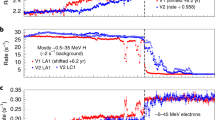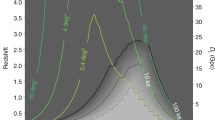Abstract
COSMIC rays are one of the chief constituents of the physical universe but their origins are still not understood. Anisotropies in the cosmic ray signal should provide information toward the solution of these problems. This report presents evidence for an anisotropy in the cosmic rays centred around 0900 h sidereal time and between +30° and +60° declination.
This is a preview of subscription content, access via your institution
Access options
Subscribe to this journal
Receive 51 print issues and online access
$199.00 per year
only $3.90 per issue
Buy this article
- Purchase on Springer Link
- Instant access to full article PDF
Prices may be subject to local taxes which are calculated during checkout
Similar content being viewed by others
References
Ryan, D., Aeosta, V., Buckwater, G., Carey, W., Cowan, C. L., and Curtin, D., Phys. Lett., 21, 475 (1966).
Buckwater, G., Cowan, C. L., and Ryan, D., Phys. Lett., 21, 478 (1966).
Cowan, C. L., Ryan, D., and Buckwater, G., Proc. Ninth Internat. Conf. Cosmic Rays, 1041 (London, 1969).
Hesse, P. W., Talbolt, F. L., and Cowan, C. L., Astrophys. J., 148, L73 (1967).
Author information
Authors and Affiliations
Rights and permissions
About this article
Cite this article
RYAN, D. Evidence for an Anisotropy in the Cosmic Ray Signal. Nature 227, 1120–1121 (1970). https://doi.org/10.1038/2271120a0
Received:
Revised:
Issue Date:
DOI: https://doi.org/10.1038/2271120a0
Comments
By submitting a comment you agree to abide by our Terms and Community Guidelines. If you find something abusive or that does not comply with our terms or guidelines please flag it as inappropriate.



